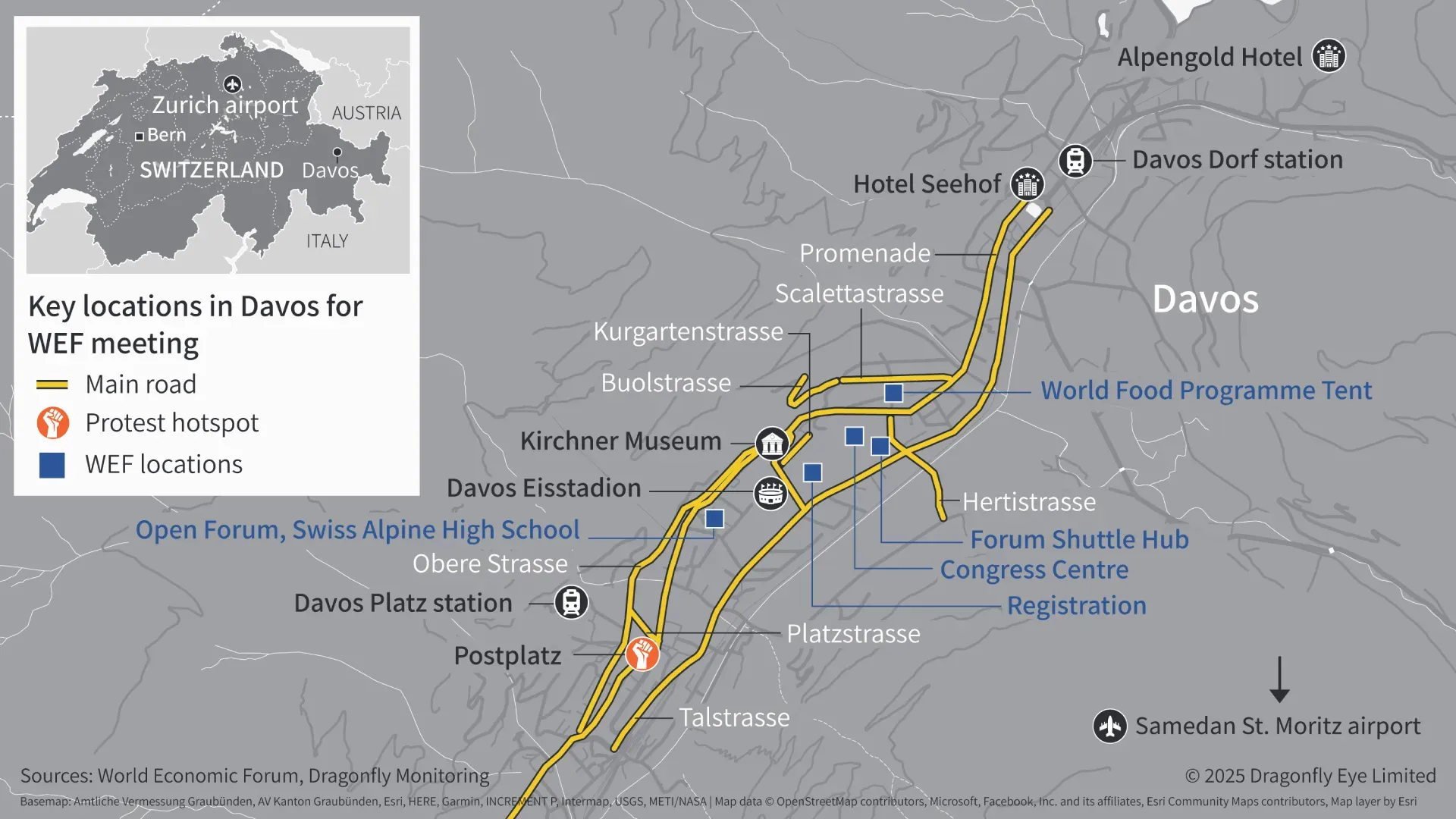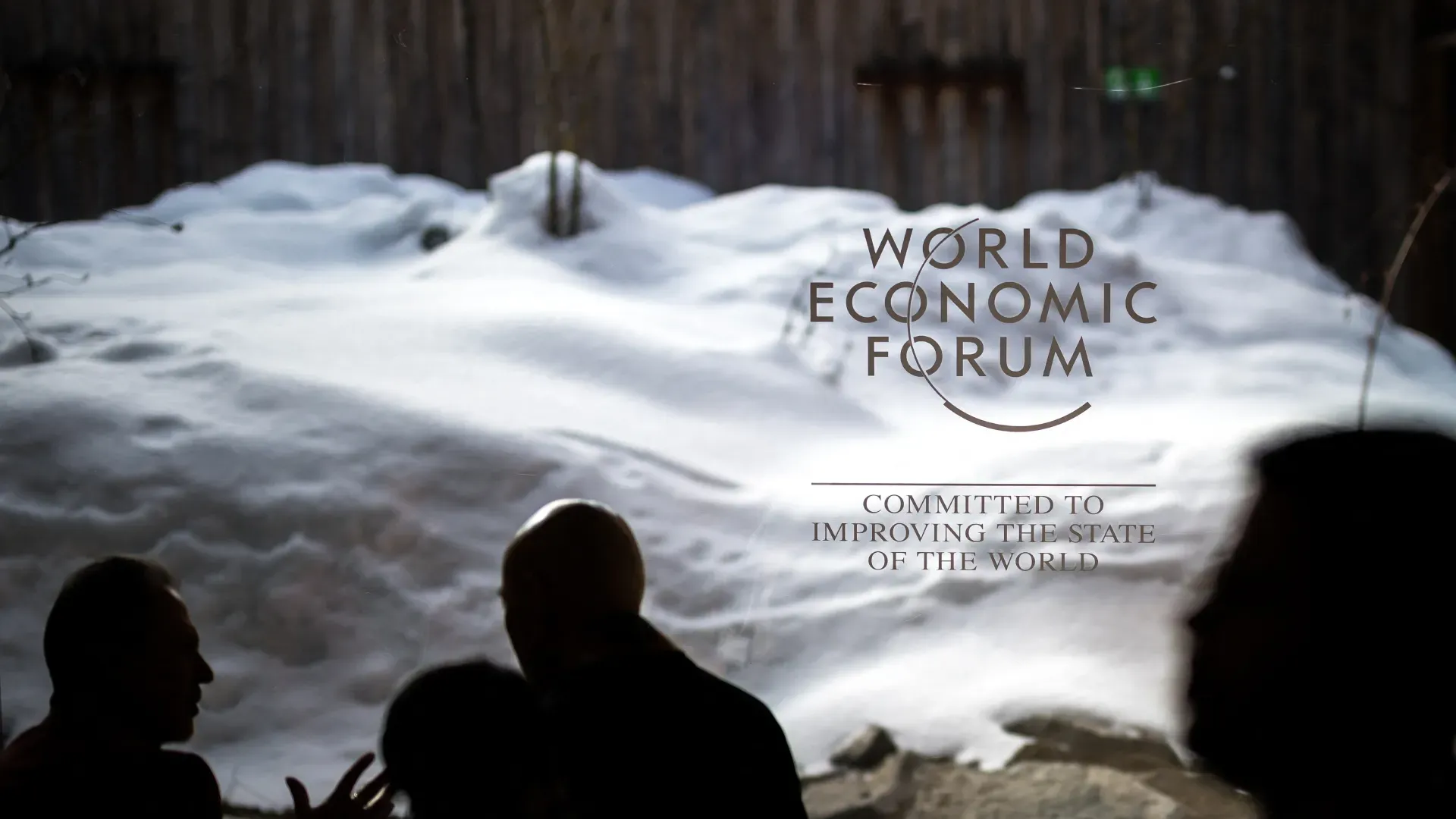The World Economic Forum (WEF) Annual Meeting in Davos, Switzerland, will probably pass off without any major security incident
This assessment was issued to clients of Dragonfly’s Security Intelligence & Analysis Service (SIAS) on 07 January 2024.
- The annual summit is scheduled to take place from 20 to 24 January
- Anti-capitalist and environmentalist protests planned around the event are unlikely to result in significant disruption or disorder
Major disruption to the World Economic Forum (WEF) Annual Meeting 2025 in Davos, scheduled for 20-24 January, appears improbable. Left-wing activists, notably environmentalists and anti-capitalists, have long expressed grievances against the forum and what they perceive to be its ‘elitist’ and ‘capitalist’ agenda. Some of these groups have planned protests against the summit in Davos and Zurich in the coming weeks. These are unlikely to result in significant disruption to the event, based on similar protests in recent years and the extensive security measures announced.
There is precedent for state-linked covert operations and limited left-wing extremism around the event. But the Swiss authorities – or any other foreign governments – have not issued any specific threat warnings ahead of the summit this year. We are maintaining our terrorism threat level for Zurich and Switzerland at moderate and our countrywide cyber threat exposure level is also moderate. The large number of high-profile attendees makes it an attractive target for foreign intelligence gathering operations, but the local authorities seem highly capable of securing the event, in our analysis.
Heightened security and travel disruptions
The Swiss authorities appear very well prepared to secure the event. They have announced the following measures in and around Davos:
- Deploying several thousand members of the armed forces in the Landwasser Valley and other major cities, particularly in Zurich and Bern
- Establishing checkpoints on several main routes to Davos, and traffic restrictions on major roads in the town. These include the main Promenade and Talstrasse streets from 17-25 January
- Conducting security checks at transport hubs, namely Davos Dorf and Davos Platz train stations, as well as nearby airports, particularly Samedan St. Moritz and Zurich airports
- Limiting access to some neighbourhoods, venues and buildings between at least 20-24 January, including the areas around the Davos Congress Centre, the Hotel Seehof, and the Alpengold Hotel
- Restricting the airspace around the town, including for drones, within a radius of 25 nautical miles (approximately 47 kilometres) from central Davos

In recent years, heavily armed police have also maintained a visible presence throughout the Davos-Klosters area and the authorities have placed concrete barricades in front of key venues. We anticipate they will do so again this year.
A few calls and plans for protests
Some anti-capitalist and environmental activists appear motivated to protest in the run-up to and during the summit this year. They have already called for demonstrations between 19-21 January. We have identified the following events from activist groups’ or individuals’ social media pages and press reporting:
- Davos, 19 January: The left-wing Strike WEF group plans to start a hike from Kublis on 18 January through Klosters and Wolfgang to reach Postplatz in Davos on 19 January, where they plan to hold a rally at 1500hrs
- Davos, 19 January: The Young Socialists Switzerland party (JUSO) intends to hold a rally at Postplatz at 1530hrs. Other activists have said on social media that they intend to join the rally
- Zurich, 21 January: Smash WEF, a far-left group, plans to hold a rally at Helvetiaplatz from around 1900hrs
Protests in Davos will probably cause minimal disruption and attract at most a few hundred people. This is based on turnout at similar protests in recent years and the relatively low engagement online with protest calls so far. The authorities have largely prevented disturbances beyond minor traffic disruptions and tussles in previous years. The authorities have cut off protesters’ access to certain roads and limited the number of activists allowed to enter Postplatz to a few hundred people in recent years. This has probably dissuaded many activists from wanting to join protests this year.
We assess that violence during protests in Davos is improbable. Any incidents would probably be limited to brief and isolated scuffles between protesters and police. While still unlikely, any violence would be more likely in Zurich, where there are fewer restrictions on gatherings and movement. This is particularly during Smash WEF’s planned rally there on 21 January. The police used pepper spray and baton rounds to disperse participants at an anti-WEF protest by the group in Zurich in 2022.
Direct action against aviation plausible
We have not seen any plans by environmentalists to target airports at Samedan St. Moritz or Zurich, the main hubs serving the WEF meeting in Davos. However, these groups often do not announce actions. In our assessment, the WEF presents a high-profile opportunity for direct action, such as blocking airport entrances or runways. Debt for Climate activists threatened to block access to the private jet airport in St. Gallen-Altenrhein last year. The group managed to disrupt the transfer of attendees travelling to Davos in 2023.
Limited extremist threat
We have not seen any specific threat warnings by governments around the summit. The security measures ahead of and during the event would probably deter any would-be attackers and significantly mitigate the repercussions and impact in the unlikely event of an attack.
Right-wing extremists, far-left activists, and conspiracy theorists have all made generic threats of violence against individuals associated with the WEF over the past several months. One anonymous user on X wrote last July that WEF founder Klaus Schwab was ‘evil’ and had to be ‘eliminated’. Other business leaders associated with the event have been similarly referenced. While those behind these remarks appear motivated to target the event online, a physical attack is unlikely. Threats have not led to any attacks on the WEF in recent years.
Cyberespionage and spyware risks to attendees
State-linked hacking groups are likely to try to conduct cyberespionage against attendees. The event presents an attractive targeting opportunity by drawing together hundreds of high-level government officials. This, for instance, could enable hackers to deploy spyware directly onto their devices if they gain physical access to them. China, Iran, Israel and Russia would probably be the main nation-state perpetrators of cyberespionage. They have done so at high-level meetings in recent years and often mount politically driven cyber operations against other countries.
There is a reasonable chance that corporate executives and industry leaders will also face attempts at commercial espionage. This could be conducted by both state-linked groups and financially motivated cybercriminals. FBI director Christopher Wray said last April that China has targeted businesses with both cyber intrusions and human intelligence operations. China has been especially intent on stealing trade secrets from Western firms in high-tech sectors like defence and IT for several decades. These would probably remain the focus for commercially motivated IP theft at the summit.
Spearphishing will probably be hackers’ main tactic to try and gain initial access to attendees’ devices. The WEF organisation in February last year warned of fraudulent emails and text messages sent by people claiming to be WEF representatives. While these were aimed at collecting financial information, hackers can embed files containing malware (such as infostealers) into spearphishing messages. Some cyberespionage operations also occur in person – there are types of commercial spyware that require physical access to a target’s device. But we anticipate this would be less common than spearphishing.
Image: Participants of the World Economic Forum (WEF) are seen in silhouette in the Congress center on the opening of the annual meeting in Davos on 15 January 2024. Photo by Fabrice Coffrini/AFP via Getty Images.




